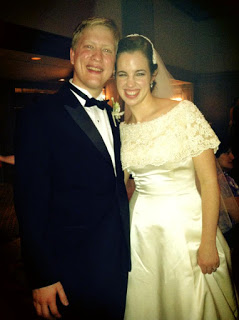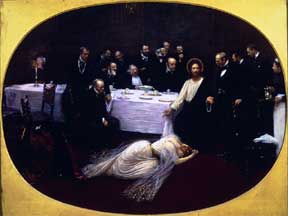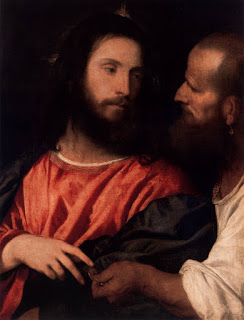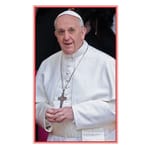This past week at the Catholic Book Blogger I did an interview with author Dr. Diane Moczar which can be found here. Additionally I posted a review of her great book The Church Under Attack : Five Hundred Years That Split the Church and Scattered the Flock. That review can be found here. I would also like to invite all of you to enter the Weekly Book Giveaway. One copy of Kevin Lowry’s Faith at Work : Finding Purpose Beyond the Paycheck. Enter Here!
Author: Monica @ Catholic Bloggers Network
Books to teach boys virtue
Finding good books for boys as they get older is always a challenge. Lat fall I put together a list of good books for boys aged 10-14 . You will see that the scope of it is limited. On my blog, I want to introduce you to some of my favorites in more detail. Not all of these are on the list.
A novel-length fairytaleThe Chronicles of Narnia by C.S. Lewis are undoubtedly already on your radar screen. The Horse and His Boy is my favorite, and one of my favorite children’s books of any genre.
It is the story of Shasta, who has been raised by a Calormene fisherman, but is light haired like the people of the north. When he overhears the fisherman negotiating to sell him as a slave to a lord, he runs away, taking the lord’s horse with him. The horse, Bree, is a talking horse from Narnia, eager to escape back to his homeland. Soon Shasta and Bree meet up with a young Calormene lady named Aravis, who is also running away with her Narnian horse. The foursome eventually get caught up in politics, racing to warn Narnia of an impending Calormene attack. And Shasta discovers his surprising, true identity.
The entire Narnia series is perfect for introducing your children to symbolism. Aslan, the great lion who rules Narnia from across the sea, represents Jesus. Shasta symbolizes each of us. We are born in slavery to sin, but freed and made children of the King.
Continue reading at Contemplative Homeschool
The Remnant
“They rejected his statutes, the covenant which he had made with their fathers. The vanity they pursued, they themselves became; they followed the surrounding nations whom the Lord commanded them not to imitate.” 2 Kings:17
The word “remnant“ has been coming to my mind a lot lately and I have been trying to write a reflection on it for days, but I could not pull it together (admittedly this is a frequent problem for me). I keep brushing the word aside thinking that the word remnant seems a tad over-dramatic. Is our culture dying so quickly that those who are still faithful to the Church’s positions on the issues of marriage, contraception and abortion in our Catholic churches are already a mere remnant (even if the pews seem full)? Surely that is overstating the case!
Yet in headline after headline, and in discussion after discussion, with Catholic individuals who ought to know better, I am finding that adhering to the Natural Law (the Ten Commandments), particularly in political views is not even considered! Many ( though not all) of my fellow parishioners use a soft sentimentality as the basis for many political positions, how you feel governs your stance. Anything that causes discomfort ought to be re-defined. This is dangerous because so many of these individuals are willingly handing over to Caesar the powers to bind or loose moral teachings – and if you try to make an argument against that, you are completely misunderstood, because so many lack an understanding of what liberty and freedom really mean!!! Are we narrowing down to a remnant of faithful Catholics?
Then the Supreme Court’s ruling striking down DOMA and dismissing Prop 8 came down, not unexpected, but still quite ominous, and after reading Elizabeth Scalia’s excellent article titled “The ‘Party’ is victor; Time to save souls and churches” I realized I was not being dramatic at all. It was the Spirit that place that word in my heart. Not to cause despair, but to show me that the seeds of renewal are even now being sown.
“So too at this present time there is a remnant , chosen by grace.” Rom 11:5
The word remnant first popped into my head during the June 7th rehearsal dinner for my son Matthew and his then bride–to-be Grace. They were married on June 8th (Yes! It was the feast of the Immaculate Heart isn’t that awesome!!!) after a real courtship that was based on discernment of God’s will for them. These two have a profound respect, for each other and their deepening love, for parental authority and a commitment to Christ through their Catholic faith. In fact, it was their Catholic faith that came shining through all the wonderful parties and joy-filled celebrations. Especially in the beautiful Nuptial Mass, where the Gospel was chanted by a newly ordained transitional deacon and Panis Angelicus , Ave Verum Corpus and Gounod’s Ave Maria were beautifully sung. The Mass and all of the celebrations that surrounded it were directly and indirectly proclaiming what marriage truly is: A covenant that is “ordered to the good of the couple, as well as the generation and education of children.” (CCC 1660) Marriage was not just about the two of them, it was a bridging of the past generations to the future ones. It was about the obligations of these two to build up a Culture of Life through their vows to each other and to God.
Both myself and Grace’s mother heard from guests who felt renewed and filled with hope after the wedding. It was so joyfully Catholic! Three generations of the priesthood participated in celebrating it and at least one other young man was undertaking serious discernment for a religious vocation. And it was at the rehearsal dinner that I looked around the room and felt the hope and promise of renewal that God is always offering us! I thought here ,in this room, are some of the remnant, the faithful remnant in an increasingly post-Christian world. God always leaves a remnant. And what a joyful remnant it was! I wish I had words for my gratitude.
Come Holy Spirit, fill the hearts of your faithful and kindle in them the fire of your love. Send forth your Spirit and they shall be created. And You shall renew the face of the earth.
The darkness of the Culture of Death’s attack on marriage, which is an attack on the Church, is even more disheartening because of the ignorant and complacent acceptance of these attacks by so many members of the Church. In the face of this daunting opposition these young people were joyfully, faithfully Catholic. They neither hiding their faith under a bushel basket, or stridently beating people over the head with it. They simply lived it with a joy and maturity. Sometimes it takes darkness to appreciate just how bright the light of Christ shines, and in the growing darkness of our world the joy of this marriage shines so brightly. I know that some of our readers have also been graced with signs of hope like this as well, and to these things we hold on to.
Because the threats that were once vague and veiled and aimed at my Church are solidifying and they are proving to be formidable. I take no comfort in President Obama’s arrogant claim the he won’t force religious institutions to accept gay “marriage”. It is a hollow promise. And every day more souls are giving up the fight, because it looks hopeless, because it is much easier to just give in, because no one they know and respect is willing to stand up and proclaim the truth, and take the insult and calumny that will result from it. The Culture of Life is facing the ravenous dragon in the Culture of Death and we appear to be losing. But we are not. Have faith and endure, and be perceptive of God’s signs of hope! There is a remnant, praise be to God!
Go then, rejoice and exalt over the children of the righteous, for they will all be gathered together and will bless the Lord of all ages. Tobit 13:13
 |
| Matthew and Grace |
And for more encouragement in strengthening and growing the “remnant” check out Deacon Paul’s link: Small Faith Communities
or if reading is more your thing: Catholic Spirituality Blogs Network
Heidi @ Journey to Wisdom
A Call To Be Annoying
Trusting God with your future

Last December, I began a quest to trust God more. It started with my reading The Way of Trust and Love by Jacques Philippe. You can read my original post on St. Therese’s trust here. (I know I link to this post a lot, but that’s because I consider it among my best. Trust is the Lesson from the Carmelite Saints that is changing my life. If you haven’t read it, I strongly encourage you to do so.)
Later, I told you how I was focusing on trusting God in the ups and downs of my day during Lent.
More recently, I have worked on entrusting my future to God. This next step began with my reading Diary of a Country Mother by Cindy Montanaro. It’s the journal of a mother reflecting on the life of her young son who has recently died. As I hinted in my review, I have struggled with entrusting my children’s futures to God. I hear of so many parents who have lost a child. Two of my siblings died in childhood. My former roommate’s daughter died at age four. Some of my readers have blogs about their losses.
Then there are the adults I know who have left the faith. Three people in my immediate family are non-practicing. Most families I know have at least one wayward member. (My husbands’ family is a rare but encouraging exception).
Shortly after finishing Cindy’s book, I picked up Left to Tell: Finding God Amidst the Rwandan Holocaust by Immaculee Ilibagiza. Immaculee lost nearly all her family to genocide. Friends and neighbors turned into deadly enemies. Yet, not only did she keep her faith–she was able to forgive the murderers.
Read the rest at Contemplative Homeschool.
Weekly Catholic Book Blogger Rewind
This was a huge week for me! I had the pleasure of interviewing Catholic author Scott Hahn. The interview can be found here. Additionally I posted a review of Scott’s book Consuming the Word. That review can be found here.
Lastly we have the weekly Catholic Book Blogger Giveaway. You can enter the contest here..
Please Pray For Me
 While reading this book, I had mixed emotions but, overall, I was a bit disappointed. On the positive side, he did include a good biography of Jorge Mario Bergoglio and selected ten quotes by Pope Francis that reveal his beliefs. He also listed an extensive bibliography of where he found his information. He did educate me on the fact that very few popes have come from religious orders. I didn’t know that and he also included a list of the ones who came from the Benedictine, Augustinian, Dominican, Franciscan, Cistercian and Jesuit Orders. Of course, it was well known that Pope Francis is the only pope from the Jesuit Order of Priests. I also appreciated his chapter on the evolution of the papal election and background information on previous conclaves.
While reading this book, I had mixed emotions but, overall, I was a bit disappointed. On the positive side, he did include a good biography of Jorge Mario Bergoglio and selected ten quotes by Pope Francis that reveal his beliefs. He also listed an extensive bibliography of where he found his information. He did educate me on the fact that very few popes have come from religious orders. I didn’t know that and he also included a list of the ones who came from the Benedictine, Augustinian, Dominican, Franciscan, Cistercian and Jesuit Orders. Of course, it was well known that Pope Francis is the only pope from the Jesuit Order of Priests. I also appreciated his chapter on the evolution of the papal election and background information on previous conclaves.
But I couldn’t help wondering how skewed it might be since Pope Francis was elected on March 13, 2013 and this book was published on May 14, 2013. Gathering information to compile a book that needed time to be edited and published meant Mr. Escobar wrote this biography, in a very short time period. I couldn’t help but wonder if there was a competition from the publishers on who would release the first book on Pope Francis?
What soured this book for me a bit, was Mr. Escobar’s comments on Pope Emeritus Benedict XVI. One can infer from his comments that he was not a fan of our previous pope. He even went as far to say that “in many ways Benedict XVI was a roadblock for the Catholic Church trying to find its way toward modernity.”
What disappointed me is that I feel it was a book on facts rather than the man himself. The ten quotes he chose to include in his book are ones I’ve heard fluttering around the various media outlets and I do find hope and inspiration from them. But it wasn’t anything new and revealing. Of course, he didn’t have time to wait for an original quote but had to use what was already out there. He obviously never met Pope Francis and interviewed him for his book. That would have brought a warmth and interesting spin to it. Perhaps I had unrealistic expectations of this book when only a few short months ago, no one here in US even knew who he was. Would I recommend this book? Not as a must read or as a type of book one can’t put down, but I would for someone who wants to learn more about the papal office and it’s history.
I was given a complimentary copy of Francis Man of Prayer from Booksneeze in exchange for my honest opinion.
Blessings,
Noreen
How to love God more

Do you ever sit up and listen suddenly during the Sunday homily? That happened to me this week. Instead of the post I was planning, I am writing about Sunday’s Gospel, as I believe the Holy Spirit desires.
You see, for the past several months, I have pictured myself as the Penitent Woman at least once every day, as I pray or seek to overcome temptation. So when the Gospel is about this moving scene, I pay close attention.
I have also lately heard people questioning the need to confess venial sins–both on the internet and in person. The Church only requires us to confess mortal sins, and venial sins can be forgiven in other ways (such as reception of the Eucharist). So why bother to go to Confession for venial sin? (By the way, the Church only requires us to receive the Eucharist once a year too–but would we be satisfied with that bare minimum?)
There are many good answers to this question. I’m going to write about one: Confessing venial sins helps us love God more deeply.
Which comes first–love or forgiveness?
There is a certain mystery surrounding the Penitent Woman, which I believe is part of God’s plan. No one knows her identity. Some say Mary Magdalen, Mary of Bethany, the woman caught in adultery, and the Penitent Woman are all the same person. Others say they are all different. I say, the Penitent Woman is all of us.
Continue reading at Contemplative Homeschool.
Catholic Book Blogger Weekly Giveaway
This week Image Books is the sponsor and the book is Scott Hahn’s Consuming the Word. Enter Here.
Catholic Book Blogger Two for One
Well folks this week I reviewed the book Man to Man, Dad to Dad : Catholic Faith and Fatherhood. That review can be found here. I also had the pleasure to interview another Catholic author. This week I interviewed the author of Man to Man, Brian Caulfield.
Continue Reading…..









